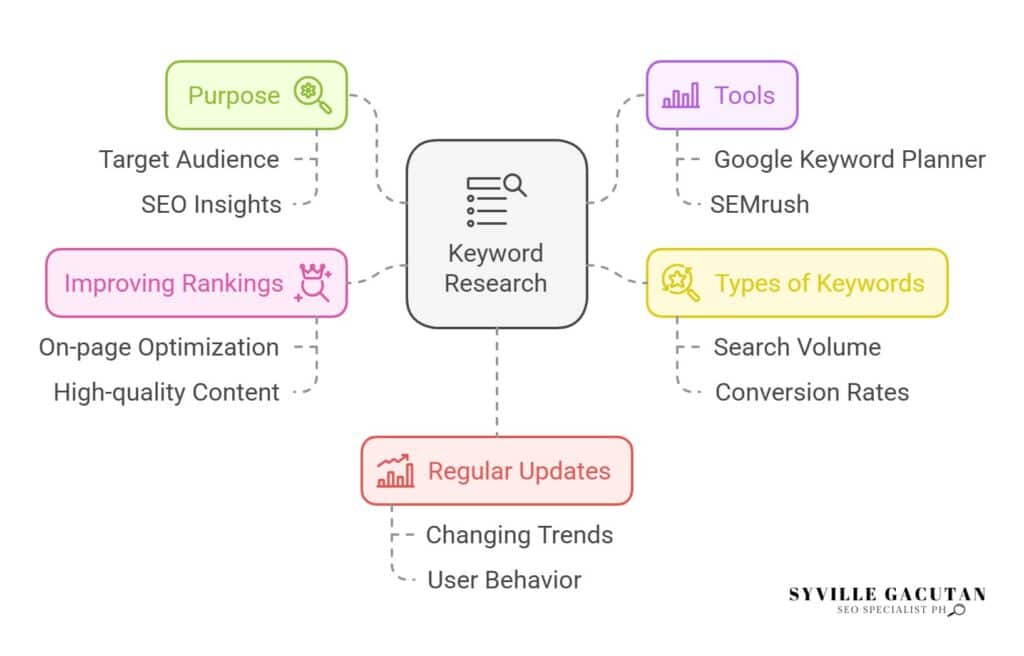
SEO Keyword Research: A Comprehensive FAQ Guide
SEO keyword research is a vital part of crafting a successful strategy. It starts by understanding the specific search terms your audience is using and utilizing tools like Google Keyword Planner, SEMrush, and Ahrefs to gain insights into search volume, competition, and trends. These insights enable you to create a more focused and impactful strategy, ensuring stronger connections with your audience. By balancing short-tail and long-tail keywords, businesses can improve visibility, drive traffic, and enhance conversion rates. This methodical process also reveals audience behavior and content gaps, enabling the creation of relevant, engaging material.For those dedicated to improving their website’s performance, mastering the beginners guide to keyword research SEO will prove incredibly beneficial.
Key Takeaways
- Keyword Research Purpose:Identifies the search terms used by the target audience, providing valuable insights that shape an effective SEO strategy.
- Tools for Insights: Utilize tools like Google Keyword Planner and SEMrush to gather data on search volume, competition, and emerging trends.
- Types of Keywords: Incorporate both short-tail and long-tail keywords for volume and higher conversion rates.
- Improving Rankings: Optimize on-page elements and create high-quality content aligned with search intent.
- Regular Updates: Continuously update the keyword list to adapt to changing search trends and user behavior.

What Is SEO Keyword Research?

SEO keyword research is the foundational step in developing an effective search engine optimization strategy. At its heart, SEO keyword research is all about discovering and understanding the search terms people use when looking for information, products, or services online. This insight helps tailor content that connects with your audience and improves your visibility. This approach enables businesses to gain valuable insight into what their target audience is actively searching for, allowing them to tailor their content to better meet those needs and drive engagement.
The keyword research process is methodical and data-driven. It begins with brainstorming potential keywords related to the business’s niche. Tools such as Google Keyword Planner, SEMrush, and Ahrefs are often employed to expand and refine this list. These tools offer valuable data on search volume, competition, and emerging trends, enabling marketers to prioritize the most effective keywords to target for better results.
Conducting keyword research is crucial as it shapes the entire SEO strategy, guiding everything from content development to on-page optimization, ensuring efforts align with user intent and search behavior. Without it, efforts to improve search engine rankings may be misdirected, targeting terms that are either too competitive or irrelevant to the audience.
Effective keyword strategies involve a mix of short-tail and long-tail keywords. Short-tail keywords are general search terms with high search volume and competition, whereas long-tail keywords are more detailed and targeted, typically resulting in better conversion rates due to their specificity and lower competition.
Why Is Keyword Research Important?
Understanding the importance of keyword research is crucial for any business aiming to enhance its online presence and achieve digital marketing success. Keyword research is the cornerstone of SEO efforts, providing direction and focus to your content strategy. Essentially, it helps identify the terms and phrases that potential customers use when searching for products or services similar to what you offer.
Effective keyword research steers your SEO strategy by ensuring your content resonates with what your audience is genuinely searching for, helping you connect with them more meaningfully. It helps in uncovering keyword opportunities that might have been overlooked, enabling your business to gain a competitive edge.
Here’s why keyword research is indispensable:
- Improved Visibility: By focusing on the right keywords for your SEO, your website can climb higher on search engine results pages (SERPs), making it more accessible for users to discover your content.
- Audience Insights: Conducting thorough keyword research provides valuable insights into consumer behavior and preferences, informing your overall marketing strategy.
- Content Relevance: Keywords guide the creation of relevant content that resonates with your audience, increasing engagement and conversion rates.
Incorporating a robust keyword research strategy ensures that your website speaks the language of your potential customers. It allows you to optimize your website content, meta descriptions, and blog posts with keywords that drive traffic and improve search engine rankings.
Furthermore, understanding the keyword landscape helps in identifying gaps and opportunities, allowing you to create content that addresses unmet needs.
What is the process for Keyword Research?

Effective keyword research is the backbone of a successful SEO strategy, and understanding its process is fundamental to achieving desired outcomes. The keyword research process involves several crucial steps, beginning with identifying your target audience and understanding their search behavior. This initial step helps in generating relevant keyword ideas that align with the interests and needs of your audience.
Once you have a preliminary list of keywords, the next step is to utilize SEO keyword research tools such as Google Keyword Planner, Ahrefs, or SEMrush. These tools provide valuable insights into search volume, competition, and trends associated with each keyword. By analyzing this data, you can refine your list, focusing on keywords that offer a balance between high search volume and manageable competition.
Another critical aspect of the keyword research process is evaluating the intent behind each keyword. This involves understanding whether users are looking for information, seeking to make a purchase, or wanting to navigate to a specific site. Aligning your keyword strategy with user intent ensures that the content you create meets the expectations of your audience.
In addition to primary keywords, consider incorporating long-tail keywords into your strategy. These are more specific phrases that, while having lower search volumes, often yield higher conversion rates due to their targeted nature.
Regularly revisiting and updating your keyword list is also one of the essential keyword research tips, as search trends and user behavior can change over time.
What are branded keywords? Are they important?

Branded keywords, often comprising a company’s name or unique products, are integral to a comprehensive SEO strategy. These keywords serve as the backbone for establishing and maintaining a strong online presence. Understanding the importance of keywords, particularly branded ones, can significantly impact a business’s search engine rankings and user engagement.
The importance of branded keywords in keyword research in SEO cannot be overstated. They cater specifically to users who are already familiar with the brand, thus driving high-quality traffic. Here are some reasons why branded keywords are crucial:
- Enhanced trust and credibility: When users search for branded keywords, they are more likely to trust and engage with the results, thereby increasing the likelihood of conversions and repeat visits.
- Higher click-through rates (CTR): Branded keywords usually result in higher CTRs since users searching for these terms have a clear intent to find information specifically related to the brand.
- Competitive advantage: By optimizing for branded keywords, businesses can better defend their online presence against competitors bidding for the same terms in paid search campaigns.
Incorporating branded keywords into your SEO strategy requires meticulous keyword research. This involves identifying relevant keywords and understanding how they align with your audience’s search behavior. Additionally, regularly monitoring and updating these keywords ensures that your brand remains relevant and visible in search engine results.
Ultimately, branded keywords play a pivotal role in strengthening a brand’s identity online. They drive targeted traffic, enhance user trust, and provide a competitive edge. Therefore, integrating keywords related to your brand into your SEO efforts is not just beneficial but essential for long-term success.
Is it okay to use keywords that have low to no volume?

In the realm of SEO, the strategic use of low to no volume keywords can sometimes be surprisingly advantageous. While it might seem counterintuitive to target keywords that have minimal search volume, there are several compelling reasons why these keywords should not be overlooked in your keyword research.
Firstly, low search volume keywords often come with lower keyword difficulty. This means that it is easier to rank for these keywords, providing an opportunity to capture a niche audience that larger competitors may ignore. By focusing on these less competitive keywords, you can steadily build domain authority and visibility in specific areas, which can eventually contribute to broader SEO success.
Secondly, low search volume keywords can be highly relevant to very specific user intents. When users search for these terms, they are often closer to making a decision or seeking highly specific information, which can lead to higher conversion rates. Incorporating these keywords into your content can therefore be an effective part of targeted SEO strategies, ensuring that you meet the specific needs of your audience.
Furthermore, keyword suggestions provided by tools during keyword research can often highlight these low volume keywords, revealing gaps in the content provided by competitors. By addressing these gaps, your website can become a valuable resource for users seeking specialized information, thereby enhancing user experience and engagement.
How do we improve keyword rankings?
Improving keyword rankings is a multifaceted process that requires a strategic approach, combining both on-page and off-page SEO techniques. To effectively improve keyword rankings, one must engage in comprehensive keyword research and SEO practices, ensuring that each step aligns with the broader objectives of the website.
First, utilizing keyword research tools is paramount. These tools help identify high-potential keywords that are relevant to your content and possess a balance between search volume and competition. Effective keyword research involves analyzing search intent and incorporating these insights into your content strategy. This ensures that your content meets the needs of your target audience and aligns with what they are searching for.
Key Steps to Improve Keyword Rankings:

- Optimize On-Page Elements: Ensure that your title tags, meta descriptions, headers, and content include your target keywords naturally. Additionally, use relevant keywords in image alt texts and URLs to enhance your on-page SEO.
- Create High-Quality Content: Content that is informative, engaging, and valuable to your audience can significantly improve keyword rankings. Regularly updating content and incorporating long-tail keywords can also drive more targeted traffic.
- Build Quality Backlinks: Off-page SEO, particularly link building, is crucial for improving keyword rankings. Acquiring backlinks from authoritative and relevant websites enhances your site’s credibility and search engine visibility.
Moreover, continually analyzing and refining your strategy based on performance metrics is essential. This iterative process ensures optimization efforts remain aligned with evolving search engine algorithms and user behavior.
Final Thoughts
Mastering SEO keyword research is essential for crafting an effective digital strategy that drives traffic and improves conversions. By understanding the importance of identifying the right keywords, using research tools, and balancing short-tail with long-tail keywords, businesses can create content that resonates with their audience. Regularly refining and updating keyword strategies is crucial in a constantly evolving SEO landscape, ensuring that businesses stay ahead of competition and adapt to changing trends.
If you’re ready to take your keyword research strategy to the next level, connect with Syville Gacutan, an experienced SEO Specialist in the Philippines. Syville can help you identify high-performing keywords, optimize your content, and drive meaningful traffic to your website. Don’t miss the opportunity to elevate your SEO success—reach out today!